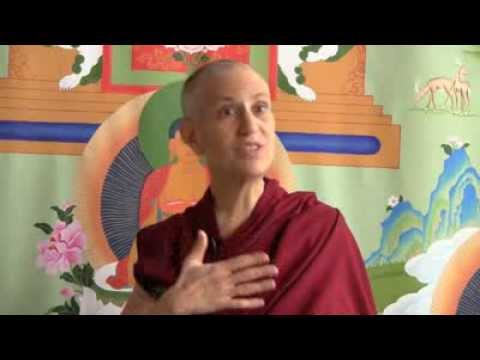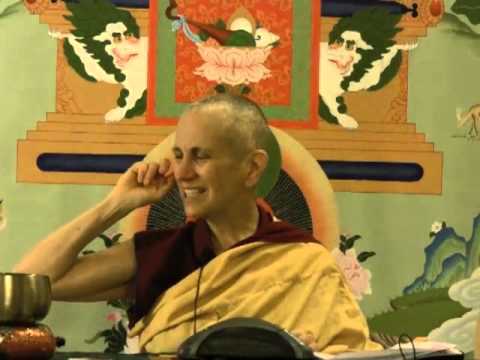Compassion and ethics in the public discourse
A talk on religion, compassion and the importance of secular ethics for the Bodhisattva's Breakfast Corner.
When I spoke about some of the ramifications of the shooting in Tucson last time, I was talking about politicians, CEOs, and leaders of whatever kind of enterprise—including in families, the family, the leaders of the family or in religious institutions—and the importance of ethical conduct in relation to that.
Confusing ethics with religion
I was thinking that we’ve gotten confused in this country about the differences between secular life, ethical conduct, religion and theology. We have a lot of misconceptions about these things, because in the name of secularism we’ve said “separation of Church and State.” And that’s fair enough; I really agree with that. But what we’ve done is we have associated ethical conduct with the Church, with religion, and by separating Church and State then it seems like the leaders have no obligation to also show a good moral example or even to bring morality, ethical conduct, kindness or compassion into the way they talk to the public.
Most of the leaders in our society talk about money: money, the economy, the war. And they think that leadership involves making the country materially prosperous and materially safe, but they’re not thinking about the social ramifications of how we go about that. They’re not thinking of the ethical implications of that either. I think that’s really important.
So, I think what’s happened is that some people have recognized we need more kindness, compassion and ethics in the public discourse. They say, “Ah, religion!” And then they confuse ethical conduct, compassion and kindness with religion, and then religion becomes also a political force. They say, “We’ve got to bring in our theology,” because they’ve confused theology with ethics and theology with compassion. “We have to bring our theology into the national discourse, into politics. We have to push for our theology to be heard.”
But I don’t think that’s the case, especially in a culture that is multi-religious. Instead we need to be based on what his holiness called secular ethics, which can appeal to all people no matter their religious background or no matter their political background. It’s just basic human values of goodness that have really gotten lost in our public life, in the political life and in the business life.
The leadership of Ashoka
If you look in the past to the great Buddhist leader Ashoka, you will see what made him so great was not that he spread Buddhist ideas like rebirth, karma and enlightenment. It was instead that he talked about ethical conduct, kindness and compassion. He lived in the 3rd century BC. He really unified India at that time. He was actually quite a big warrior, and it was after one battle where he had slain many, many people that he just looked at what he had done and said, “This is wrong.” And he completely changed his method of governance. If you go to India nowadays, there are many Ashoka pillars because he would erect these pillars throughout the country, talking about doing good works in the community, about benefiting people, about not stealing, about respecting each other; he talked about these kinds of things to really educate the populace. It didn’t have to do with religion, but one of the things that made him such a great leader is that he did that.
I think we need more of that kind of leadership in our society instead of either the religious or political bickering, and the harsh speech. And like I was talking about yesterday, it is what we’re modeling for young people about how important people talk to each other. My goodness! It’s totally upside down. We need a way of modeling some methods that can appeal to everyone, that can hold the society together.
Wherever our leadership abilities play a role—and all of us have some leadership abilities in different contexts—we may not be involved in politics or business, but we are involved in religion, ethical conduct, spreading compassion. Whatever it is we’re involved with, our examples matter. In a family also the parents have to act ethically if the children are going to act ethically. And it also applies to teachers in our school system, social workers, cops and everybody in whatever field they are in where their leadership stands out. If we do that from the perspective of kindness and compassionate ethics, it can have a very powerful voice in our society. I think that’s very much what we need.
I was very touched by an article that somebody sent us about a woman who used to be a cop and also an assistant attorney general, and she was in the probation department too. She’s become a disciple of Thich Nhat Hanh and teaches mindfulness meditation to cops. She said that when she first learned it, her instant reaction was, “I can’t. I can’t meditate. I can’t do Buddhism. I’m a cop. I carry a gun.” And then she realized, “No, I can,” because somebody said to her: “But of all the people who carry guns, the mindful people should be the people who carry them.” [laughter] So, that got her going in her practice, and she does these courses now for the people who carry guns. She says it’s amazing to see the cops take off their bulletproof vests and then sit down and meditate. I think this is more of what we need in our society.
Venerable Thubten Chodron
Venerable Chodron emphasizes the practical application of Buddha’s teachings in our daily lives and is especially skilled at explaining them in ways easily understood and practiced by Westerners. She is well known for her warm, humorous, and lucid teachings. She was ordained as a Buddhist nun in 1977 by Kyabje Ling Rinpoche in Dharamsala, India, and in 1986 she received bhikshuni (full) ordination in Taiwan. Read her full bio.


